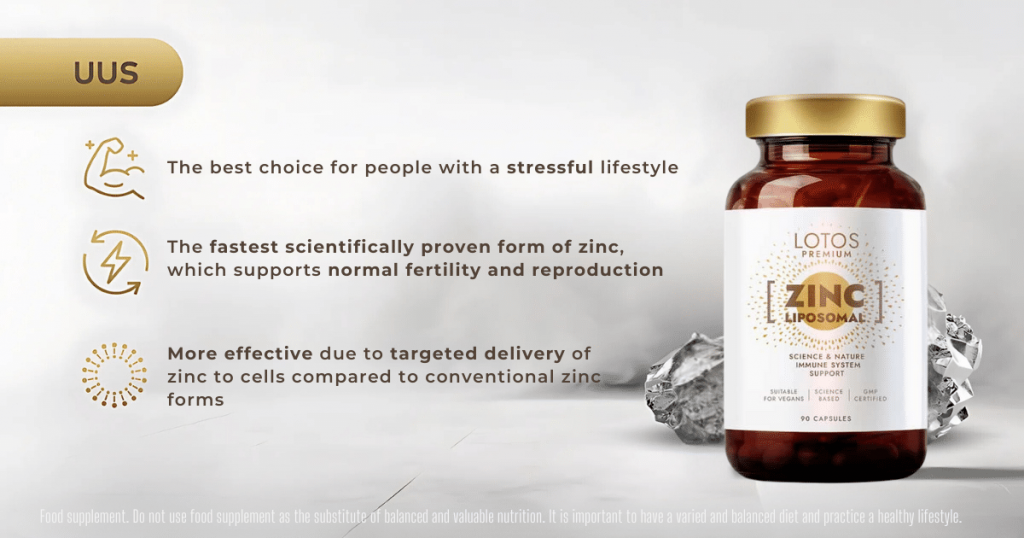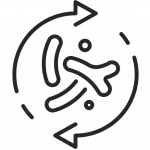The Invisible Power of Zinc in Fertility

Zinc is one of the most underrated yet essential trace elements in the human body. Its impact ranges from immune support to metabolic functions, but its role at the very beginning of life — from conception to birth — is especially crucial. A scientific article published in the International Journal of Molecular Sciences in 2021 offers an in-depth look at how zinc affects fertility, pregnancy, and child development.
Surprisingly, zinc deficiency remains widespread globally — according to the World Health Organization (WHO), approximately one-third of the world’s population has insufficient zinc levels. This can lead to various health issues, including reduced fertility in both men and women. Zinc is vital for maintaining reproductive capability in both sexes, as it is essential for normal fertilization and early embryonic development.
Zinc as a Supporter of Sperm Quality
In male fertility, zinc plays a key role in testosterone production, sperm maturation, and motility. Its antioxidant properties protect sperm cells from DNA damage. Several clinical studies have shown that zinc supplementation significantly improves sperm quality, especially in men with low baseline levels. For example, a 3-month course of 220 mg zinc sulfate markedly improved sperm motility and morphology.
Zinc as a Reproductive Health Supporter in Women
In women, zinc supports menstrual cycle regulation, follicle maturation, and ovulation. Zinc deficiency can lead to hormonal imbalances — including reduced estrogen levels — and interfere with conditions required for conception. Zinc also plays a critical role in the early development of the fertilized egg, supporting cell division and genomic stability.
Zinc Supporting Fetal Development and Pregnancy
During pregnancy, the need for zinc increases significantly. This mineral is involved in the development of the fetal nervous system and organs, placental function, and maternal immune support. Studies have linked zinc deficiency to increased risks of preterm birth, low birth weight, and miscarriage. For proper placental function, zinc is vital, as it ensures the effective exchange of nutrients between mother and fetus.
The Role of Zinc Supplements in Fertility Treatment
According to research, zinc supplementation has produced positive results in over half of infertility treatment cases. This applies to both men and women undergoing fertility therapy. Interestingly, many assisted reproductive technology (ART) centers incorporate zinc supplements as part of standard treatment protocols. Although the exact mechanism of action is not yet fully understood, a positive correlation has been found between zinc use and the success rate of ART methods.
Childbirth and the Beginning of New Life
At the time of childbirth, zinc helps regulate uterine contractions and placental separation and supports hormonal balance in the postpartum period. For the newborn, zinc is critically important during the first months of life — it supports immune system maturation, brain development, and overall growth.
Daily Zinc Requirements
Daily zinc needs depend on age, gender, and physiological state (e.g., pregnancy, lactation). The table below shows the recommended daily intake levels according to the U.S. National Institutes of Health (NIH):
Recommended Dietary Allowances (RDA) for Zinc
(Source: NIH Office of Dietary Supplements)
| Age Group | Men | Women | Pregnancy | Lactation |
|---|---|---|---|---|
| 0–6 months | 2 mg | 2 mg | – | – |
| 7–12 months | 3 mg | 3 mg | – | – |
| 1–3 years | 3 mg | 3 mg | – | – |
| 4–8 years | 5 mg | 5 mg | – | – |
| 9–13 years | 8 mg | 8 mg | – | – |
| 14–18 years | 11 mg | 9 mg | 12 mg | 13 mg |
| 19+ years | 11 mg | 8 mg | 11 mg | 12 mg |
This table helps assess whether your daily diet truly meets your zinc requirements. Considering that zinc deficiency impacts the entire body, it’s worth monitoring regularly and correcting levels with supplements when needed — especially in the context of fertility and pregnancy.
Dietary Sources of Zinc
Zinc is found in a diverse and balanced diet. Animal-based foods — such as red meat, liver, seafood (especially oysters and shrimp), dairy products, and eggs — contain zinc in a highly bioavailable form. Plant-based sources also provide zinc, including:
- legumes (beans, lentils, chickpeas),
- whole grains,
- seeds and nuts — especially pumpkin seeds and cashews.
However, it should be noted that zinc absorption may be lower in vegetarians due to the presence of phytates in plant-based foods. In such cases, zinc supplements may be considered, particularly during fertility treatment, pregnancy, or breastfeeding.
Liposomal Zinc – Enhanced Absorption for Better Results
Liposomal zinc is an innovative supplement form in which the active ingredient is encapsulated in liposomes made of phospholipids. This technology ensures better bioavailability of zinc and protects it from degradation in the digestive tract, allowing more efficient absorption at the cellular level.
LOTOS PREMIUM Liposomal ZINC is a science-based, GMP-certified dietary supplement suitable for vegans. Each capsule contains 19.9 mg of zinc (199% of the daily recommended value). The product contributes to normal:
- carbohydrate metabolism,
- cognitive function,
- immune system function,
- protein synthesis,
- fertility and reproduction,
- maintenance of testosterone levels,
- bone, hair, and nail health.
The product is manufactured according to Lotos Pharma quality standards, using liposomal technology to ensure effective absorption and maximum efficacy.
The Invisible Power of Zinc in Fertility

References:
- Ali, S., Jahan, S., & Shahid, S. (2021). Role of Zinc (Zn) in Human Reproduction: A Journey from Initial Spermatogenesis to Childbirth. International Journal of Molecular Sciences, 22(4), 2188. https://doi.org/10.3390/ijms22042188
- NIH Office of Dietary Supplements. (2022). Zinc – Fact Sheet for Health Professionals. https://ods.od.nih.gov/factsheets/Zinc-HealthProfessional/






